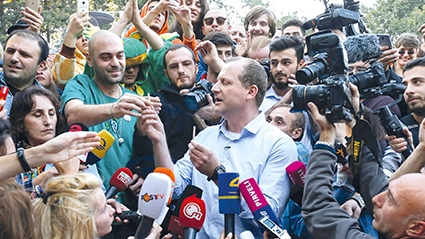Politician & Supporters Arrested at Cannabis Festival
On October 20, Zurab Japaridze, the founder of an opposition party and presidential candidate for the elections to be held on October 28, was detained during a cannabis legalization festival organized by his political party Girchi at Dedaena Park, along with ten others.
Georgian media reported that Japaridze distributed ‘joints’ and told attendees that he was waiting for the police to react as his actions were illegal. The police, already present in large numbers at the park, arrested him a few minutes later.
Although the Interior Ministry stated that Japaridze voluntarily followed police officers, bystanders witnessed others being forcibly carried away by as many as six police officers.
The festival, organized by the opposition party Girchi, was already deemed illegal under Georgian legislation. The Interior Ministry saw the festival's organization as an ‘intention to commit organized crime’ and warned party leaders that encouraging the use of narcotics is against the law. Undeterred by the warning, Girchi held the festival regardless.
Despite Georgia’s reputation for strict recreational drug laws, marijuana has become a hotly contested focal point of the upcoming presidential elections.
The rise of the debate surrounding marijuana follows a draft law that would allow government-licensed companies to grow cannabis for export abroad as well as establishing rules for recreational cannabis consumption in Georgia. This controversial proposal could enable Georgia to benefit from the billion-dollar medical cannabis market. Akaki Zoidze, the Chairman of Parliament’s Healthcare Committee told the online news site Netgazti that “if we tap 10 % of that market, we could be looking at a billion dollars of [annual] income for the economy.”
However, the controversial proposal has seen heated debates. Grigol Vashadze, running on behalf of the United National Movement, uses the slogan “Don’t Let Them Turn Georgia into a Cannabis Republic.” He accuses Georgian Dream, the governing party, of planning to turn Georgia into a “drug-dealing” economy and a nation of “stoners,” while others warn that cannabis could replace grapes as Georgia’s national crop and turn the country into a drug haven.
Japaridze, on the other hand, claims that consuming cannabis is a constitutional right. In July, he won a landmark case in the Constitutional Court, decriminalizing the personal use of marijuana. However, the ambiguous law is unclear to many Georgians. Some activists and lawyers have been asking the government to also decriminalize the possession of marijuana to make the law clearer.
Much of the controversy surrounding the law is fuelled by fear that the founder and chairman of Georgian Dream, Bidzina Ivanishvili, wishes to benefit personally from the monetary potential of the cannabis export industry. He already holds shares in Goldman Sachs, who have started funding the production of medicinal cannabis in the United States. Mikheil Saakashvili, the exiled former president, voiced these concerns from abroad. Speaking from Amsterdam, he said, “Ivanishvili wants to turn Georgia into a drug hub, a nation of cartels.”
The son of Ivanishvili, rapper Bera, released a song calling for the legalization of cannabis, named “Legalize it,” during the drug-policy protests this spring.
The Georgian Orthodox Church, known for their conservative grip on Georgia, is one of the loudest opposers to the potential legalization of cannabis. Father Andria Jamghaidze warned “next we will see similarly liberal approaches to cocaine and heroin.”
The Church’s criticism is thought to be the reason for the decision to halt discussions around the marijuana law for two months. Georgian Dream has said that they will use this time to explain the law to the Church, although the Church has already stated they will not compromise on their stance.
A lack of education surrounding the recreational use of cannabis could lead to problems, especially among Georgian youth. Accused by the Church as being a “Cannabis Queen” due to her support for the law, Salome Zurabishvili, an independent MP supported by Georgian Dream, has instead stated, “I will be the Queen of an awareness campaign that must be held in Georgia to inform the youth of the damage that drugs do to their health.” Although well-intended, some fear that such a campaign will be unsuccessful.
Zurab Japaridze was released by police after questioning the following day. The outcome of the elections and the debate surrounding cannabis remains open.
By Amy Jones
Image source: Reuters











